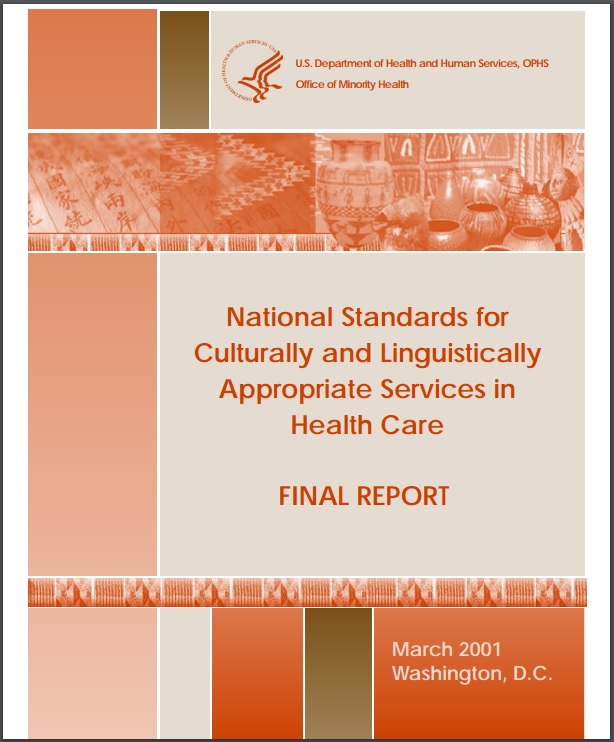
Cultural and linguistic competence is widely recognized as the fundamental aspect of quality health care (including mental health), particularly for the diverse patient population. It acts as an essential strategy for reducing disparities by improving access, utilization and quality of care.
 (Enhanced) National Standards for Culturally and Linguistically Appropriate Services (CLAS) in Health and Health Care
by
(Enhanced) National Standards for Culturally and Linguistically Appropriate Services (CLAS) in Health and Health Care
by
 The National Standards for Culturally and Linguistically Appropriate Services in Health and Health Care: A Blueprint for Advancing and Sustaining CLAS Policy and Practice (The Blueprint)
by
The National Standards for Culturally and Linguistically Appropriate Services in Health and Health Care: A Blueprint for Advancing and Sustaining CLAS Policy and Practice (The Blueprint)
by
 Behavioral Health Implementation Guide for the National Standards for Culturally and Linguistically Appropriate Services in Health and Health Care
by
Behavioral Health Implementation Guide for the National Standards for Culturally and Linguistically Appropriate Services in Health and Health Care
by
 National Standards for Culturally and Linguistically Appropriate Services in Health Care: Final Report
by
National Standards for Culturally and Linguistically Appropriate Services in Health Care: Final Report
by
 Cultural Competencies for Nurses: Impact on Health and Illness, 2e
by
Cultural Competencies for Nurses: Impact on Health and Illness, 2e
by
 How our Unconscious Biases Toward Racial and Sexual Minorities Are Affecting Clients and What to Do
by
How our Unconscious Biases Toward Racial and Sexual Minorities Are Affecting Clients and What to Do
by
 Cultural Diversity: Orientation For Asian Cultures
by
Cultural Diversity: Orientation For Asian Cultures
by
 Developing Cultural Competence
by
Developing Cultural Competence
by
This three-program series addresses the important need for cultural awareness in the provision of healthcare in the 21st century, showing how cultural diversity impacts mutual understanding on many levels and in a variety of aspects of daily life. Both verbal and non-verbal communication differences are addressed. The discussion covers the cultural demographics of the United States and the demographic differences between the general population and healthcare providers.
 Understanding the Need: Cultural Awareness in Healthcare
by
Understanding the Need: Cultural Awareness in Healthcare
by
 An Action Plan: Cultural Awareness in Healthcare
by
An Action Plan: Cultural Awareness in Healthcare
by
 Your Practice: Cultural Awareness in Healthcare
by
Your Practice: Cultural Awareness in Healthcare
by
The following video is part of the Films on Demand: Nursing Collection which is licensed for use by current students, faculty, and staff. Off-campus use requires a current PCT username and password.
 The Cultural Framework for Health: An Integrative Approach for Research and Program Design and Evaluation
by
The Cultural Framework for Health: An Integrative Approach for Research and Program Design and Evaluation
by
 Fact Sheet #3: Health Literacy and the Role of Culture
by
Fact Sheet #3: Health Literacy and the Role of Culture
by
 Summary of State Law Requirements Addressing Language Needs in Health Care
by
Summary of State Law Requirements Addressing Language Needs in Health Care
by
 A Comprehensive Framework and Preferred Practices for Measuring and Reporting Cultural Competency
A Comprehensive Framework and Preferred Practices for Measuring and Reporting Cultural Competency













